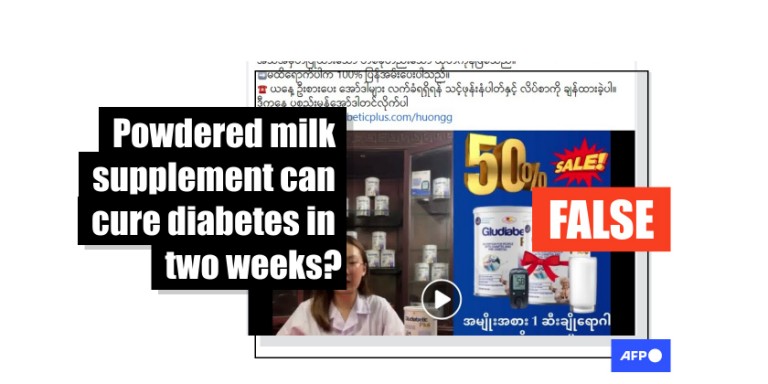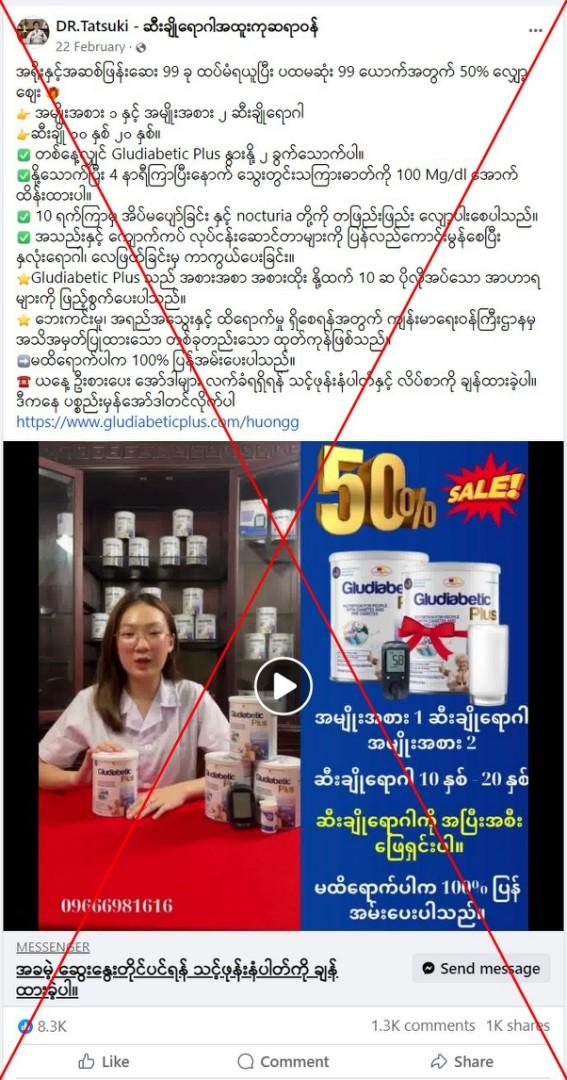
Adverts share fabricated news articles falsely touting diabetes 'cure'
- This article is more than one year old.
- Published on June 27, 2024 at 06:27
- 2 min read
- By AFP Thailand
A Burmese-language advertisement for a powdered milk product named "Gludiabetic Plus" racked up more than 450,000 views since it was shared on Facebook on February 22, 2024.
The video shows a woman next to several tins of the product, along with text that repeated the false claim.
A voiceover could be heard claiming drinking two glasses of "Gludiabetic Plus" could cure the two main types of diabetes "in just 15 days".

The post also linked to a blog post that read in part: "Media reports have said Gludiabetic Plus milk powder is effective."
"The product is recognised by the U.S. FDA and it has been helping diabetic patients in Myanmar and foreign countries," it added, referring to the Food and Drug Administration (FDA).
The post went on to feature a purported FDA certification as well as supposed reports about the product from CNN and The New York Times.
Another post repeating the false claim was also published here.
No cure for diabetes
A spokesperson for the US Centers for Disease Control and Prevention (CDC) told AFP on June 14 that a cure for diabetes did not exist yet.
"But you can manage diabetes by keeping your blood sugar levels in your target range and doing things like eating healthy food, being active, and taking medications as prescribed," the spokesperson went on to say.
Dr Thurein Hlaing Win, country manager of healthcare website Hello Sayarwon in Myanmar, also told AFP said there was no evidence the product had benefits for people with diabetes.
"These supplements may have negative impacts on diabetic patients as they might contain sugary products," he said.
People with type 1 diabetes will need to take insulin every day and it cannot be prevented, according to the World Health Organization (archived link).
The condition is caused by the body's inability to make insulin, which helps convert sugars in food into energy. This causes blood sugar levels to rise, which can lead to serious health problems (archived link).
The CDC said type 2 diabetes, where the body does not use insulin well, can be prevented by making lifestyle changes such as eating a healthier diet and becoming more physically active (archived link).
Fabricated reports
Furthermore, the supposed media write-ups of the product were fabricated.
"CNN never reported this or on this company," Emily Kuhn, senior vice president of communications at CNN Worldwide, told AFP on June 14.
Nicole Taylor, managing director of external communications at The New York Times, also said the image in the advertisement was "digitally altered".
"The New York Times did not write or publish the five stories relating to Gludiabetic shown here, nor the images associated with these stories," she told AFP.
Keyword searches on Google found no such articles were published on the websites of CNN or The New York Times.
The US FDA said it does not issue device registration certificates while a keyword search found on its database of approved drugs found no results for Gludiabetic Plus (archived links here and here).
AFP has previously debunked other false posts touting unproven diabetes remedies here, here and here.
Copyright © AFP 2017-2026. Any commercial use of this content requires a subscription. Click here to find out more.
Is there content that you would like AFP to fact-check? Get in touch.
Contact us
